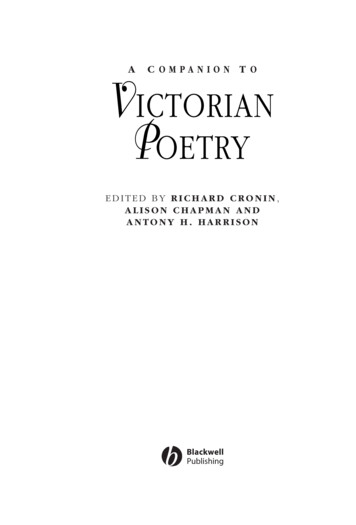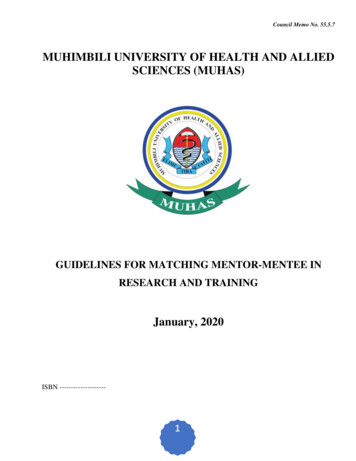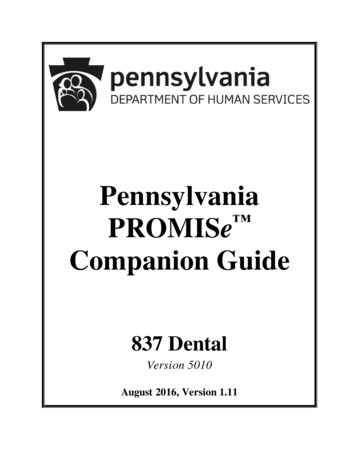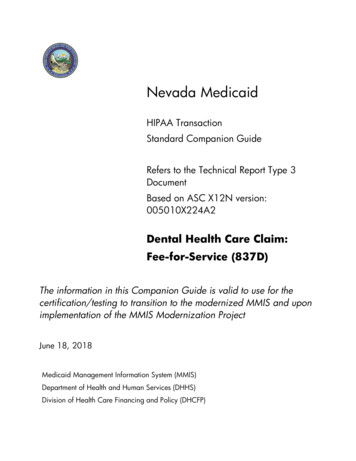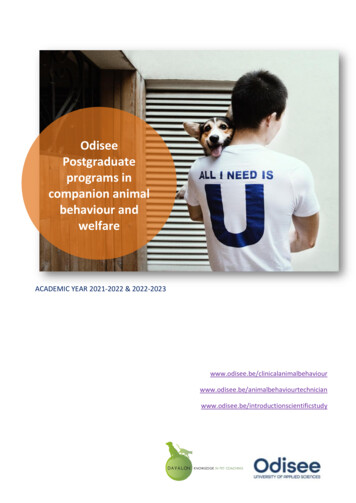
Transcription
OdiseePostgraduateprograms incompanion animalbehaviour andwelfareACADEMIC YEAR 2021-2022 & ntroductionscientificstudy
ContentImproving companion animal behaviour and welfare? Yes we will!. 3What are your professional possibilities? . 4How we help you to achieve your goals . 5Dog, cat and an optional species. 6We go worldwide! . 6Another option: follow individual modules . 7Which course suits you best? . 8Postgraduate course in Clinical animal behaviour (CAB) – Clinical animal behaviourist . 8Your professional dream comes true? . 8Entry requirement . 9What will you learn?. 9Course content Clinical animal behaviour . 9Online workshops . 10How do we assess your knowledge? . 11Feedback on the course from our CAB-alumni. 11Postgraduate course in Animal behaviour (ABT) – Animal behaviour technician . 12Your professional dream comes true? . 12Entry requirement . 13What will you learn?. 13Course content Animal behaviour technician . 13Online workshops . 15How do we assess your acquired knowledge? . 15Feedback on the course from our ABT-alumni . 15What is the difference between Clinical Animal Behaviourist (CAB) and Animal Behaviour Technician (ABT)?. 16Practical information . 17What is the tuition fee?. 17Postgraduate course in Clinical Animal Behaviour (PG CAB) . 17Postgraduate course Animal Behaviour Technician (PG ABT) . 17Individual modules . 17Optional module . 17How does the online course work? . 182
I already have studied in this field of study: can I ask for exemptions? . 18How do I apply for an exemption? . 19Who are my contact persons in this course? . 19Who are my lecturers in this course? . 20Testimonials . 20Improving companion animal behaviour and welfare? Yes we will!Many pet owners and their animals suffer although owners describe their companion animals as familymembers. Unfortunately, many do not succeed to provide proper care for their cat, dog, rabbit or horse.The cause?The owners are misinformed. There are too many unqualified ‘professionals’ working in the field and too fewinstitutions to obtain a recognized qualification.The result?Pets develop health and behaviour problems, they experience a poor quality of life and the human-animalbond breaks down. In some cases the dog, cat, rabbit or horse will be abandoned or euthanized.Let’s prevent this!The foundations for a lifelong happy human animal bond are created when proper care is given. Thisincludes providing the biological, behavioural and emotional needs of an animal.At Odisee we want to improve the welfare of companion animals. We train you to become a professional inthe animal care sector. Odisee has been providing these accredited courses based on the latest scientificknowledge for 15 years.We offer postgraduate courses for the role of Clinical AnimalBehaviourist and Animal Behaviour Technician. Let’s have alook what could be the right course for you.1 Foto door Trinity Kubassek via PexelsIf your answer to one or more of the questions below is YES, you meet our student profile: 3You want to obtain an academically recognized qualification.You are interested in companion animal behaviour, welfare and training for the prevention of ordealing with problem behaviours.
You already work with companion animals and want to broaden or top up your skills.You are interested in a career in the companion animal businesses, including working as a clinicalanimal behaviourist, working in the companion animal care sector such as veterinary clinics, sheltersand catteries, dog schools, or companion animal related enterprises and organizations and want toobtain an academically recognized qualification? You might want to participate in the whole courseto obtain a thorough theoretical understanding of the field based on the latest scientific knowledgeand to develop the necessary practical training and communicative skills.You might want to follow a specific module only to top up your knowledge and want to obtain anacademically recognized qualification?You have a good knowledge of the English language, in understanding as well as in writing.You have a bachelor degree.What are your professional possibilities?Our best ambassadors are our alumni and current students. Let’s have a look at what they say and do as ajob.They provide behavioural services by running their own behaviour clinic or training classes. Some areresponsible for the behavioural program and behavioural clinic in veterinary clinics and shelters. Jos Jongen (The Netherlands)Katrien De Clercq (Belgium)Ingrid Van Overbeke (Canada)Kristiina Torp (Finland)Teresa Umbelino (Portugal)Benjamin Jacobs – de Katadviseur (Belgium)Josine Warnier – de Nijnerij (The Netherlands)Jozefien Dirckx – Kallie Dierengedragstherapie (Belgium)Jessica Postelmans – Monsieur Gustave (Belgium)Cedrick van Gronsveld – Kwispeltherapie, founding member of Vereniging voor VlaamseDiergedragsprofessionals (Belgium)They educate pet owners. Ilse works as a veterinary behaviourist and wrote a book and gives seminars andworkshops to inform owners how to care for their pets to have a happy live. Liselot works for anorganization to help animals in need. Ilse Rediers – Boek Een vlekkeloos hondenleven (Belgium)Liselot Boersma – Stichting DierenLot (The Netherlands)Eva and Joke organise a course on Dog Assisted Interactions at Odisee (http://www.odisee.be/nl/DAI ) 4Eva Lambrecht (Belgium)Joke Decru (Belgium)
Eva Sterk – Koninklijk Nederlands Geleidehonden Fonds (The Netherlands)How we help you to achieve your goals1. An academically recognized qualificationOdisee University of applied sciences is an accredited education provider. The quality of our courses isguaranteed through internal accreditation through the academic committee and program committee ofOdisee. After successful completion of each module you obtain internationally recognized ECTS credits.What is ECTS?The European Commission explains this as follows:“ECTS allows credits taken at one higher education institution to be counted towards a qualification studiedfor at another. ECTS credits represent learning based on defined learning outcomes and their associatedworkload. ECTS enhances the flexibility of study programmes for students.”Read more on their website.Odisee offers two courses or qualifications: The Postgraduate course in Clinical Animal Behaviour. Leading to a role of Clinical AnimalBehaviourist (PG CAB). 60 ECTS1 and a duration of 2 years.The Postgraduate course in Animal Behaviour. Leading to a role of Animal Behaviour Technician (PGABT). 40 ECTS and a duration of 2 years.2. Online course virtual workshopsWe combine online learning with virtual workshops with your peers, and in small groups of 4 to 6 students.We focus on companion animals being dogs, cats, small prey mammals (with the emphasis on rabbits) andhorses. At the start of the academic year you receive a timetable with start dates of each module, when theexams are planned and when you have an assignment deadline.We choose for a multidisciplinary approach, drawing on scientific knowledge and techniques from forexample ethology, biology, psychology, veterinary science, anthrozoology, animal cognition, law and ethicsand welfare science.Online lectures are given by international experts in the field. They introduce theoretical concepts, provideinformation that is not easily available through other sources or discuss and highlight specific topics.Each online module is introduced by a course syllabus which guides you through the module, explains whatthe learning aims are, how to start with the module and what is expected of you. The course syllabus alsoinforms you on the assessment (multiple choice exam, assignment) and how to study this. It is your guidelinethrough the module.1ECTS ECTS credits or study points. One ECTS credit is equal to a workload of 25 study hours. One ECTS is equal to 2.5 UK CAT points at level 7.5
The lecturers upload pre-recorded video lectures. You can view these whenever it suits you best. Eachmodule also provides a reference list with important literature on the module’s topic.Your lecturers are academics that are at the forefront of the field. They facilitate and guide your learningtowards achieving the learning outcomes of the courses. You can always contact them or the modulecoordinator should you have any questions on their lecture.Get to know them on our website/Facebook.During the virtual workshops you develop under the supervision of tutors your practical skills in animalhandling, training, communication and conducting behaviour consultations.To achieve this goal, you participate in online workshops consisting out of sessions with the whole class,sessions in small groups, practical assignments and individual sessions with your tutor.Dog, cat and an optional speciesYou choose an additional species that you will study inthe course, besides dogs and cats. You can choosebetween small mammals or horses. In the modules youwill receive lectures and literature references on yourchosen species. In some assignments you will be able todevelop a treatment for your optional species.2 Photo by Anna Shvets via PexelsWe go worldwide!In 2021-2022 we open our courses to students from all over theworld!Until now we worked with real life workshops in TheNetherlands. Due to entry restrictions in the European EconomicArea we were thus not able to allow non-European students inour course.In 2020-2021 we reinvented our workshops into an onlineversion due to the Covid19 pandemic. This worked very well andwe decided to continue this online approach. So, wherever youlive on our planet: if you have a computer and a good internet3 Photo by Dziana Hasanbekava via Pexels6
connection, you can join us!Another option: follow individual modulesInterested in the program but not ready to take the whole course? Maybe you want to learn more about justone aspect of animal behaviour and welfare?You can choose to register for individual modules of one of the offered courses, without subscribing for thewhole course. You can only register for a complete module (not partial). Some modules require theknowledge of the previous module. If you wish to take only some modules, please contact us:Heidi.poelman@odisee.be7
Which course suits you best?Postgraduate course in Clinical animal behaviour (CAB) – Clinical animalbehaviouristThe question is not,“Can they reason?” nor,“Can they talk?”but, “Can they suffer?”Jeremy Bentham (1789)4 Photo by Aloïs Moubax via PexelsYour professional dream comes true?You are (or will be) working in the animal care sector, with responsibility for planning and managing humaneapproaches to prevent and address behaviour and welfare problems including behavioural disorders incompanion animals. You want to meet the academic requirements of the profession of clinical animalbehaviour counselor. To have an extensive understanding of clinical animal behaviour and the relatedscientific/clinical literature and to achieve specialist knowledge based on the latest scientific insights in thefield of companion animal behaviour and counseling. You wish to be qualified to develop a behaviouraldiagnosis and implement an effective and feasible behaviour modification program for dogs and cats(obligatory) and horses or small prey mammals (Optional. You should choose one option). You might want todevelop an academic career, get involved in scientific research or provide consultancy services.8
Entry requirementYou have (at least) a bachelor degree (level 6) with a good command of the English language. Werecommend a master degree for this course.Who?Do you have a master’s degree? Do you want to give companion animals a better life by running your ownbehavioural referral practice? Or would you love to teach about animal behaviour and welfare?Academic writing in English does not scare you?This is the perfect course for you!What will you learn?You will obtain a lot of theoretical knowledge, as well as practical skills.At the end of the course this will be your profile:--You have an in-depth understanding of normal and pathological behaviour of companion animals.You understand their behavioural and welfare needs.You have the expertise to assess the behaviour and welfare of companion animals.You have the theoretical knowledge to diagnose behaviour problems and to compose behaviourmodification programs including the use of psychopharmacological interventions in cooperationwith a veterinarian if you are not a qualified vet yourself.You have the practical handling and training skills to implement behaviour modification programs inpractice.You have professional skills in client counseling and effective communication.With these skills you will be able to work as a qualified Clinical animal behaviourist!Course content Clinical animal behaviourModulesM1 Ethology of companion animalsM2 Learning theory and animal trainingM3 The welfare of companion animalsM4 Anatomy and physiology and theinteraction between health and behaviourM5 Animal law and ethicsM6 Clinical procedures: TheoreticalbackgroundM7 Clinical procedures: workshopsM8 Research methods and practiceTOTAL:Optional: Introduction to the scientific studyof CABW9ECTS creditsper module8641047516603
In the first year you work on the modules 1-2-3-4 (28 ECTS). In the second year you continue with themodules 5-6-7-8 (32 ECTS).You can read more on the content of each module in the ECTS-document on our website:www.odisee.be/clinicalanimalbehaviourIn CAB you learn how to develop a behavioural diagnosis of pathological behaviour. You will be able to treatpathological behaviour through the use of psychopharmacology yourself if you are a veterinarian, or incooperation with a veterinarian if you are not a veterinarian yourself.LanguageIn the CAB-course all lectures, assignments, exams and workshop days are in English. A good knowledge ofEnglish is important!Do you have limited experience in scientific writing or do you feel unsure about this?In order to be well prepared for the CAB course assignments, we strongly advise you to participate in theoptional module on ‘Introduction to the scientific study of Companion Animal Behaviour and Welfare’ (3ECTS) before the start of the CAB course. In this module you learn how to search for scientific literature, howto interpret scientific papers and how to write assignments correctly using scientific based knowledge and ascientific writing style. It offers you the necessary knowledge to write scientifically based assignments for thepostgraduate course.This module is offered online and costs 390. You can register for this module at any time.Find out more about this module: www.odisee.be/introductionscientificstudyOnline workshopsIn the online workshops we will help and encourage you to develop your practical skills in animal trainingand behaviour counselling. To achieve this goal, you participate in online workshops consisting out ofsessions with the whole class, sessions in small groups, practical assignments and individual sessions withyour tutor.Under the supervision of your tutors you practice and develop your skills in animal handling and training.You conduct cases studies to practice your skills in history taking, the development of a behaviouraldiagnosis and the composition and communication of effective and feasible behaviour modificationprograms. Five virtual workshop days are scheduled during the first year and five during the second year ofthe course.10
What do you learn during the workshop days?We work on the following items:Interpreting animal behaviour using real life videos on animal behaviourAnimal handling through analysing videos and feedback on your own handling skills.Animal training through analysing videos and feedback on your own training skill while teaching an animalspecific behaviours.Composing training programs.Giving animal training instructions.How do we assess your knowledge?To assess whether you meet the academic requirements of the course you submit written assignments,practical assignments and participate in multiple choice exams. The assessment method per module isspecified in the ECTS files on the course website. This is the link.After successful completion of the course you will receive a Postgraduate diploma in Clinical AnimalBehaviour of Odisee University of Applied Sciences. This certificate is an academically recognizedqualification.Feedback on the course from our CAB-alumniThis course is a solid, strong base, which will finally connect bits and pieces from different roles in my life.Even more important it contributes to better welfare of my own doggy pack.I am very impressed with the kindness and personal approach in registration and the transition to the secondyear. My emails are always answered quickly, extensively and friendly.This course gave me a solid scientific base from which to work with my clients and their animals. In additionto using more general advice that will help any owner or animal I am now able to make individual treatmentplans adapted to the owners' resources and the needs of the animal based on scientific research.The assignments were very cleverly thought out. I loved it when each time a new module started I would readthe assignment and not have a clue what was required as an answer. Then I started reading the givenmaterial in alphabetical order or as it was listed and bit by bit the pieces for the assignment started to fall inplace.11
Postgraduate course in Animal behaviour (ABT) – Animal behaviourtechnician“All creatures aredeserving a life free fromfear and pain.”Maura Cummings5 Photo by Alexandr Podvalny via PexelsYour professional dream comes true?You are (or will be) working in the animal care sector, with responsibility for planning and managing theprevention of welfare and behaviour problems and humane approaches to the treatment of behaviourproblems. This involves understanding, evaluating and addressing inappropriate or problematic behaviourswithin individual animals, through the development of suitable environments and effective trainingprograms based on scientific evidence and best practice.You might be working with animals and their owners in a preventive context. For example in a veterinarypractice by organizing consultations for puppy or kitten owners or conduct behavioural consultation toprevent or treat problem behaviours related to a lack of or inappropriate learning experiences.You might be working in an animal shelter and monitor the behaviour and welfare of the animals under yourcare, develop programs to increase the animals’ welfare and adoption chances.You coach the staff, volunteers, foster parents and adopters. You might run your own behavourial referralclinic, to treat behaviour problems, provide training classes and rehabilitation training.12
Entry requirementYou have (at least) a bachelor degree (level 6) with a good command of the English language.If you do not have a bachelor degree you can apply for admission through an evaluation of your portfolioand submission of a motivation letter. You find detailed instructions and the deadline for submission on ourwebsite by following this link: www.odisee.be/en/faq-cab-abtWho?Are you an alumnus or last year student from a professional bachelor in animal care? Do you wish tobroaden your knowledge on welfare and behaviour of companion animals?This is the perfect course for you!Other profiles are, of course, also welcome in this course.No bachelor degree?Convince us of your enthusiasm and interest in the field of animal behaviour and welfare! You might havefollowed other courses or have tons of experience with animals? Write it in your portfolio and yourmotivation letter. More details on our website on this link.What will you learn?You will obtain a lot of theoretical knowledge, as well as practical skills.At the end of the course this will be your profile:--You have an in-depth understanding of the normal behaviour, behavioural needs and welfare ofcompanion animalsYou have the expertise to provide prophylactic behavioural advice to owners/handlers/keepersYou have the expertise to assess the behaviour and welfare of companion animalsYou have the theoretical knowledge to diagnose behaviour problems and to compose behaviourmodification programs for behaviour problems resulting from a lack of or inappropriate learningexperiences.Not included in the course is the required expertise to diagnose and treat pathological behaviourproblems. This means you cannot treat companion animals with abnormal behaviour as a result ofemotional disorder or mental health issues.You have the practical handling and training skills to implement behaviour modification programs inpracticeYou have professional skills in client counseling and effective communicationWith these skills you will be able to work as a qualified Animal behaviour technician!Course content Animal behaviour technicianModulesM1 Ethology of companion animals13ECTS creditsper module8
M2 Learning theory and animal trainingM3 The welfare of companion animalsM4 Animal law and ethicsM5 Anatomy and physiology and theinteraction between health andbehaviourM6 Clinical procedures: TheoreticalbackgroundM7 Clinical procedures: WorkshopsTOTAL:Optional: Introduction to the Scientificstudy of CABW6441053403In the first year you work on the modules 1-2-3-4 (22 ECTS). In the second year you continue with themodules 5-6-7 (18 ECTS).You can read more on the content of each module in the ECTS-document on our website:www.odisee.be/animalbehaviourtechnicianIn ABT you focus more on giving advice to prevent behaviour problems. You inform owners on how to treatbehavior problems due to insufficient or wrong management and learning experiences. In a professionalcontext you will use management and training exercises for rehabilitation of the animals under your care.LanguageIn the ABT-course all lectures are in English. However, you can take your multiple choice exam in Dutch. Wewill try to form Dutch-spreaking groups for the workshops and you can submit your assignment in Dutch ifthe corrector is Dutch-speaking.Do you have limited experience in scientific writing or do you feel unsure about this?In order to be well prepared for the ABT course assignments, we strongly advise you to participate in theoptional module on ‘Introduction to the scientific study of Companion Animal Behaviour and Welfare’ (3ECTS) before the start of the ABT course. In this module you learn how to search for scientific literature, howto interpret scientific papers and how to write assignments correctly using scientific based knowledge and ascientific writing style. It offers you the necessary knowledge to write scientifically based assignments for thepostgraduate course.This module is offered online and costs 390. You can register for this module at any time.Find out more about this module: www.odisee.be/introductionscientificstudy14
Online workshopsWe will help and encourage you to develop your practicalskills in animal training and communication. To achieve thisgoal you participate in online workshops consisting out ofsessions with the whole class, sessions in small groups,practical assignments and individual sessions with yourtutor.Under the supervision of your tutors you practice anddevelop your skills in animal handling and training. Youconduct cases studies to practice your skills in animalbehaviour training and the composition andcommunication of effective and feasible behaviourprograms. Five virtual workshop days are scheduled duringthe first year and five during the second year of the course.6 Photo by Pixabay via PexelsWhat do you learn during the workshop days?We work on the following items:Interpreting animal behaviour using real life videos on animal behaviourAnimal handling through analysing videos and feedback on your own handling skills.Animal training through analysing videos and feedback on your own training skill while teaching an animalspecific behaviours.Composing training programs.Giving animal training instructions.How do we assess your acquired knowledge?To assess whether you meet the academic requirements of the course you submit written assignments (inEnglish or Dutch), practical assignments (in English or Dutch) and participate in multiple choice exams (inEnglish or Dutch). The assessment method per module is specified in the ECTS files on the course website.This is the link.After successful completion of the course you will receive a Postgraduate diploma in Animal Behaviour ofOdisee University of Applied Sciences. This certificate is an academically recognized qualification.Feedback on the course from our ABT-alumni15
I hope to use this course to use in my job. Helping out more foster families whose dogs have behaviouralproblems. Working more on an individual basis with them.The knowledge of the lecturers and the quality of the articles ensure that this course is important for anyonewho wants to work professionally with animals. However, I advise everyone to make enough time for this,especially in combination with a job or a family.Thanks to the training, I have a solid scientific framework to support my animal supervision.What is the difference between Clinical Animal Behaviourist (CAB) andAnimal Behaviour Technician (ABT)?Differences at a glance:1. Level of difficulty: master level vs bachelor level2. Study load: 60 ECTS vs 40 ECTS3. Difference in assessments: more formative and summative assignments in CAB4. Language demands: completely in English (CAB) or possibility to do (the assessment of) somemodules in Dutch5. Difference in learning on behaviour problems: pathological vs insufficient/wrong learningexperiencesRead more details on the differences between ABT and CAB:Animal behaviour technician 16Bachelor level40 ECTS – 10 workshop daysNo formative assessments, less summativeassessments, more multi-ple choice exams.Language: all learning material is in Englishbut you are able to submit assignments inDutch when the corrector is Dutch-speaking.We try to form Dutch-speaking workshopgroups. You are able to use a translationand/or explanatory dictionary on the exam.Focus on giving advice to prevent behaviourproblemsFocus on the treatment of behaviorproblems due to insufficient or wrongmanagement and learning experiences.Clinical animal behaviour High academic course level more in directionof a master level60 ECTS – 10 workshop daysFormative and summative assignmentsexcept for one module.Language: all learning material is in English.All assessments (assignments, exams) are inEnglish. You are able to use an explanatory(English) dictionary on the exam.On top of giving advice on behaviourproblems you will focus on developing abehavioural diagnosis of pathol
programs in companion animal behaviour and welfare. 2 Content . You are interested in companion animal behaviour, welfare and training for the prevention of or dealing with problem behaviours. 4 You already work with companion animals and want to broaden or top up your skills.

